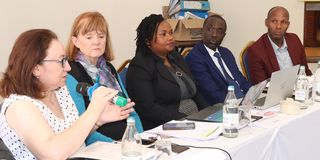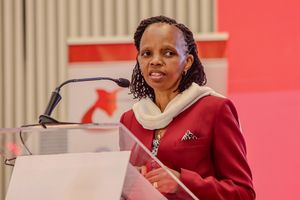Prioritise patient safety, Kenya's nuclear regulator tells hospitals

From left: International Atomic Energy Agency course facilitators Bouchra Boustani and Debbie Gilley with KNRA officials Sarah Thande, Shadrack Kiti and Isaac Mundia at the end of a training session in Nairobi on January 19, 2024.
The Kenya Nuclear Regulatory Authority (KNRA) has urged hospitals to work round the clock to ensure the safety of patients remains their top priority.
The call was made at the end of the KNRA-organised national course on regulatory control of radiotherapy practices in Nairobi on Friday.
Mr Shadrack Kiti, the KNRA's director of licensing and standards, urged medical practitioners to comply with set safety standards and adopt the latest healthcare technologies.
Mr Kiti said the authority would continue to work with local and international stakeholders to ensure radiation safety and the safe use of nuclear technologies.
At the same time, he urged health institutions to work with regulators to ensure harmony in procedures and processes that affect services from time to time.
"It is important that the regulator is well informed and stays ahead of the industry. Furthermore, the benefits of radiation and nuclear technologies should be communicated to all, including policy and decision-makers, so that safety in the use of nuclear technology is given the priority it deserves and safety is not compromised," Mr Kiti told the course participants.
The official added: "KNRA remains open to working with all stakeholders to ensure that the highest standards are maintained.
The week-long training, which began on January 8, saw the authority conduct mock inspections at city hospitals.
"This course was important in light of ongoing conversations about the need for stakeholders to work together to improve patient safety," KNRA Chief Nuclear Inspector Sarah Thande told journalists at the end of the training on Friday.
The course was aimed at assisting the KNRA in strengthening its regulatory infrastructure to control radiotherapy practices. This is expected to have a positive impact on the Kenya Kwanza government's agenda of quality healthcare and the fight against cancer.
"President William Ruto's bottom-up agenda has five key priority areas such as agriculture, micro, small and medium enterprises, health, affordable housing and digital and creative economy. We are taking our role in improving healthcare seriously," said Mr Kiti.
There are currently 13 radiotherapy centres in the country and work is underway to install two more external beam radiotherapy units at Coast General Teaching and Referral Hospital and Nakuru Teaching and Referral Hospital.
The training included theoretical and practical sessions aimed at assisting KNRA in strengthening its regulatory infrastructure. Facilitators were from the International Atomic Energy Agency, Spain, Nigeria and the US. There were observers from Algeria, Burkina Faso and Morocco.





